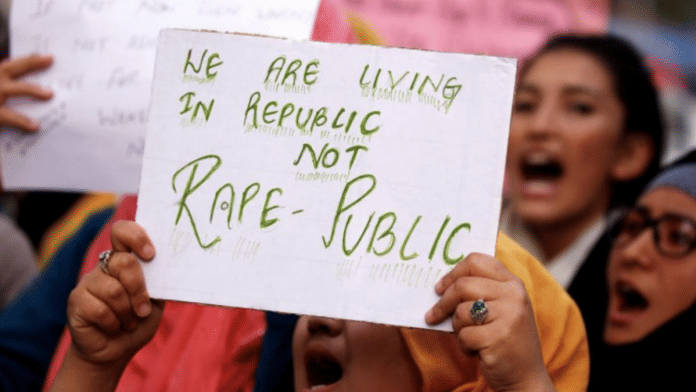New Delhi: A Delhi court Tuesday issued death warrants against the four Nirbhaya convicts who raped and brutally murdered a 23-year-old physiotherapist in the capital on 16 December 2012. They are now scheduled to be executed at 7 am on 22 January.
The four convicts — Mukesh, Pawan Gupta, Vinay Sharma, Akshay Kumar Singh — are yet to exhaust all the legal remedies they can avail for commutation.
They may still move the Supreme Court, with a curative petition, and the President, with a mercy plea, to have their death sentence commuted to life imprisonment. The convicts’ lawyer, A.P. Singh, said after the verdict that they would file a curative plea before 22 January.
The Patiala House court set 7 January as the date for taking up the matter of the convicts’ death or ‘black’ warrant after it was informed last month that the review petitions by all four had been dismissed by the Supreme Court.
The top court had upheld death penalty for the convicts in 2017. While the review petitions filed by Pawan, Vinay and Mukesh were rejected in July 2018, Akshay’s, filed in December last year, was turned down the same month.
Under the law, death warrant proceedings take place after the person on death row has exhausted all legal remedies available — a review against the SC verdict, a subsequent curative petition if the plea is rejected, and a mercy plea before the President of India.
For example, in terrorist Yakub Memon’s case, the death warrant issued on 30 April 2015, scheduling his execution for 30 July 2015, was argued to be invalid as the option of curative plea was yet to be exhausted. He later filed a curative petition before the Supreme Court on 22 May 2015, which was rejected on 21 July 2015. He was subsequently hanged.
The hearing on the death warrant comes as the court hears a petition filed by Nirbhaya’s parents to expedite the execution of the convicts. During the proceedings Tuesday, sessions judge Satish Arora expressed concern about the delay in proceedings.
Arguing for the warrant to be issued, the prosecutor pointed out that none of the convicts currently had any petitions pending before the Supreme Court or the President.
They argued that the convicts could also exhaust their legal options after the warrant was issued. The date of execution in this case, the prosecutor said, could be postponed by the Supreme Court.
Also Read: Nirbhaya’s mother welcomes Supreme Court decision to reject review plea
A black warrant
Issued by the central government, a black warrant is addressed to the officer in-charge of the jail where the death-row convict is lodged. The warrant identifies the convict, the case in which he/she is convicted, the day he/she was awarded the death penalty and the court that confirmed the capital punishment.
It expressly states the final instruction: “This is to authorise and require you [the jail officer] to carry the said sentence into execution by causing the said [name of convict] to be hanged by the neck until he be dead…”
The black warrant then provides the time and place of the execution before asking the jail officer concerned to respond with a certificate of the convict’s execution. The warrant is signed by a judge of the trial court that awarded the death penalty and also carries a seal of the court.
There were altogether six convicts in the Nirbhaya case. While one, a minor at the time of the crime, was sentenced to three years in a juvenile home and subsequently released, prime suspect Ram Singh allegedly committed suicide in jail in 2013.
Also read: Black warrant hearing in 16 December gangrape-murder case today. This is what the law says







hand them soon